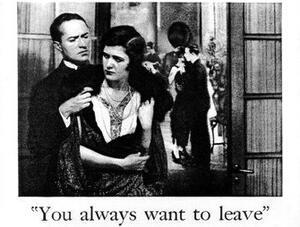Seeing is Believing
A well-coiffed, wide-eyed woman, mouth open, stares up at me. She is holding what looks like a bottle of soda. “You mean a woman can open it?” says the caption beneath her.
A tanned, wide-eyed woman, mouth open, stares transfixed at the man opposite her. The man is staring back at her just as intently while blowing cigarette smoke at her chin. “Blow in her face and she’ll follow you anywhere” says the caption beneath them.
A red-haired woman turns away from the man next to her. This time, her eyes are closed in what seems like an expression of willful defiance. The man stares up at her, hands out above some unknown device, frustrated. This time, the caption reads: “Is it always illegal to kill a woman?”
These advertisements, written roughly forty to fifty years ago, speak for themselves. (I found them in a blog post called “Vintage Politically-Incorrect Advertising”—never have I been more grateful for political correctness.) Interestingly, all of them seemed to be aimed at men. I suspect the reason for that is a simple one: the men, at the least in the eyes of the ad men, were the ones with the money in their pockets.
But things are different now. According to the U.S. Department of Labor, women make up 46 percent of the nation’s workforce. Though the gender wage-gap remains frustratingly real, the economic agency women in this country have gained in the past few decades is remarkable. In the wake of this, a new kind of market has arrived on the scene: that of the politically-minded woman. This woman is independent: financially, mentally, or both. She wants to participate in the consumer-world, but she will no longer put up with advertisements that are dishonest and demeaning to her sex. Companies such as Verizon and Dove are releasing body-positive, pro-empowerment campaigns catering to her tastes. And despite my proclivity for cynicism, I have to say I am kind of eating this up.
These “feminist” ads are proof that feminism—that women controlling their destinies in general—is not something that can be dismissed as niche or radical. The individuals who run these companies are not ignorant. They do not act on whims, but on research and widespread trends. If they are using feminism (even the blow-dried, two minute and thirty second version of feminism) to market their products, it is because that is what their customers want to see. As more women and young girls see positive messages being associated with products, “feminine” or otherwise, they will begin to associate feminism as part of being female, hopefully forging a cycle of high self-esteem.
So what if these versions of feminism are a little too trite, or even manipulative? I am under no illusions that the advertising machine that produces these campaigns is profoundly different than the one that created Soda-girl and her smoke-loving pal. But I watch these ads, with their up-tempo music and towering graphics, and in the face of all my efforts not to be swayed by people I know are in it for the money, I come away feeling happy. Genuinely happy. Millions of girls teetering on the brink of self-loathing will see these ads and feel the same thing I did, if only for a moment. That is powerful. That is momentous. Call me a sucker, but I think we’re on the right track here.
This piece was written as part of JWA’s Rising Voices Fellowship.







